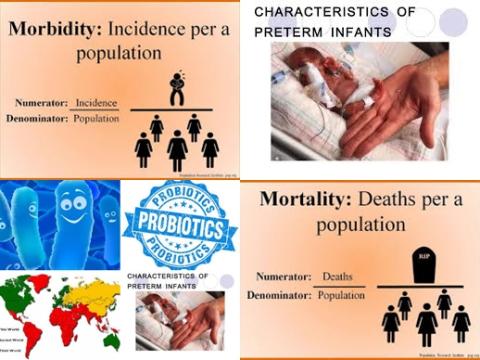
Objectives:
Although there is an overall reduction in underfive mortality rate, the progress in reducing neonatal mortality rate has been very slow. Over the last 20 years, preterm births have steadily increased in low-income and medium-income countries (LMICs) particularly in sub-Saharan Africa and South Asia. Preterm birth is associated with increased mortality and morbidity, particularly in LMICs. Based on systematic reviews of randomised controlled trials (RCTs), many neonatal units in high-income countries have adopted probiotics as standard of care for preterm neonates. Therefore, this review article (meta-analysis) has been conducted.
Do probiotics reduce mortality and morbidity in preterm neonates (born 37 weeks) in low-income and medium-income countries?
Study design:
This review article included 23 RCTs (n = 4783) conducted in 10 different low-income and medium-income countries in 4 continents with preterm neonates born at a gestational age (GA) 37 weeks or LBW (2500 g) or both.
Out of the 23 included studies, single-strain probiotics were used in 11 studies, whereas 12 used multiple strains. Lactobacillus was part of the supplementation in 13 studies; Bifidobacterium was part of the supplementation in 11 studies and Saccharomyces in 3 studies.
The results were significant on random effects model analysis and after excluding studies with high risk of bias. No significant adverse effects were reported.
Results and conclusions:
The investigators found in 20 trials (n = 4022), a significantly reduced risk of 54% [risk ratio = 0.46, 95% CI = 0.34 to 0.61, p 0.00001, I2 = 19%, p = 0.22] for the risk of necrotising enterocolitis (NEC greater than or equal to stage II) for probiotic supplemented neonates.
The numbers needed to treat (NNT) with probiotics to prevent one case of necrotising enterocolitis was 25 [95% CI = 20 to 50].
The investigators found in 18 trials (n = 4062), a significantly reduced risk of 20% [risk ratio = 0.80, 95% CI= 0.71 to 0.91, p = 0.0009, I2 = 25%, p = 0.16] for the risk of late-onset sepsis (LOS) for probiotic supplemented neonates.
The numbers needed to treat (NNT) with probiotics to prevent one case of late-onset sepsis was 25 [95% CI = 17 to 50].
The investigators found in 19 trials (n = 4196), a significantly reduced risk of 27% [risk ratio = 0.73, 95% CI = 0.59 to 0.90, p = 0.003, I2 = 0%, p = 0.67] for the risk of all-cause mortality for probiotic supplemented neonates.
The numbers needed to treat (NNT) to prevent one death by probiotic supplement was 50 [95% CI = 25 to 100].
The investigators concluded that probiotics have significant potential to reduce mortality and morbidity (eg, NEC, LOS) in preterm neonates (born 37 weeks) in low-income and medium-income countries. Considering the burden of death, disease (NEC, LOS) and suboptimal nutrition in preterm neonates in LMICs, cooperation between various stake holders (eg, industry, scientists, regulatory agencies) is warranted to either develop or to improve access to high-quality safe and effective probiotics in such set-ups. Support from organisations such as the WHO is important in providing access to probiotics for the countries (eg, sub-Saharan Africa) where most prematurity related deaths occur. Whether probiotics could be used for research and/or routine use in preterm neonates in LMICs will depend on the national health priorities, resources and ethics.
Original title:
Benefits of probiotics in preterm neonates in low-income and medium-income countries: a systematic review of randomised controlled trials by Deshpande G, Jape G, […],Patole S.
Link:
http://bmjopen.bmj.com/content/7/12/e017638
Additional information of El Mondo:
Find more information/studies on food fortification/malnutrition, probiotics and study design/meta-analysis/significant right here.